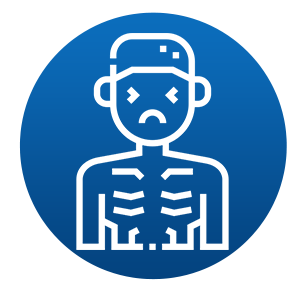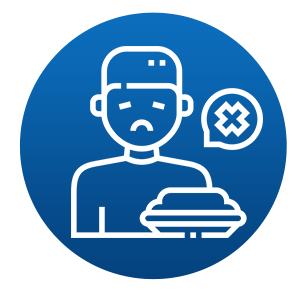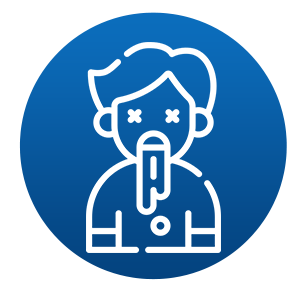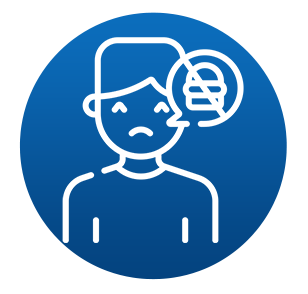Eating Disorder Treatment Near Dayton, Cincinnati, and Columbus, OH
Improve Your Relationship with Your Body — Start Eating Disorder Recovery Today

Eating Disorder Doctors in Ohio
KAV Mental Health & Psychiatry, based in Southwestern and Central Ohio, is a mental health services provider. Our comprehensive range of treatments, including psychiatric care, medication management, and counseling and therapy services, enable us to meaningfully care for patients who come to us with a wide array of mental health issues.
We understand that the many different eating disorders can affect each person in unique ways. We give every patient a personalized treatment plan that can help them learn the best ways to develop a healthy relationship with food, improve their self-image, and more. Read on for information about common eating disorders, and what we can do to help here at KAV Mental Health & Psychiatry.
What Are Eating Disorders?
An eating disorder is a serious mental health disorder in which someone does not have a healthy relationship with food or nutrition. This unhealthy focus on food impacts their day-to-day schedule, relationships with others, emotions, behaviors, and ultimately their sense of self-esteem.
Someone with an eating disorder may go extremely far out of their way to control their diet, and schedule their entire day around it. Each variation has its own dangers: Having less food in your system, especially when coupled with excessive exercise, can leave you malnourished and exhausted. Eating excessively can bring about fatigue, obesity, and other health problems. And purging (intentionally vomiting) is known to be extremely dangerous for internal organs over time.
Types of Eating Disorders
There are a large number of eating disorders, but some of the most common forms include:
Anorexia nervosa
Causes someone to see themselves as overweight, no matter what their weight is. They will often starve themselves to unhealthy or even life-threatening degrees.
Bulimia
Characterized by episodes of binging and purging food. They might restrict their diet for long periods, then eat large amounts of food, and then immediately rid their body of it.
Binge eating
Leads someone to eat large quantities of food and feel like they have no control over their eating. They may try to hide this from others, or feel shame over the situation.
Ruminating / Regurgitating
Not always associated with a mental health disorder, this involves regurgitating food — even unintentionally — and either spitting it out or swallowing it again.
Avoidant or Restrictive Food Intake
Someone may not eat because they don’t like sensory components of eating, or fear choking. This goes far beyond being a “picky eater”.
Symptoms can vary by disorder, but if you notice any of the following,
there’s a chance that there’s an underlying issue that needs to be addressed.
- Skipping meals, or eating separately prepared meals, for unclear reasons
- Obsessively talking about diets, their own weight, or other things about their body
- Eating excessively, both during or between meals
- Exhibiting depression or anxiety over their diet or looks
- Not participating in social activities or avoiding others, particularly around food
- Any purging behavior
While these are useful general signs to know, individual disorders will have more specific signs. For example, someone with bulimia might have a regularly sore or swollen throat, or calluses on their knuckles from inducing vomiting.

There are several factors that can make someone more likely to develop an eating disorder, including:
- Genetics or Family History: It’s more common for someone to have an eating disorder if their parents or siblings also had one.
- Mental Health: If someone has other mental health conditions, such as anxiety or depression, that contribute to a lowered sense of self-esteem that leads to an eating disorder.
- Stress: People under high amounts of stress may be at higher risks of developing an eating disorder, possibly without realizing it at first.
- An Already-Existing Diet: People who diet too much deprive the brain and body of nutrients, which affects their brain’s relationship to food and perpetuates unhealthy eating habits.
- Desire for Control: Someone who feels a deep need for control may develop an eating disorder because, paradoxically, the tunnel-vision fixation on diet and exercise might give them a false feeling of control even as other aspects of their health fall apart.
If we look at the most-affected demographics of eating disorders, it’s primarily teens and young adults, and specifically women and girls. While anyone can develop an eating disorder, it’s important to keep an eye on age and gender as risk factors as well.

Signs & Symptoms of Eating Disorders

Symptoms can vary by disorder, but if you notice any of the following, there’s a chance that there’s an underlying issue that needs to be addressed.
- Skipping meals, or eating separately prepared meals, for unclear reasons
- Obsessively talking about diets, their own weight, or other things about their body
- Eating excessively, both during or between meals
- Exhibiting depression or anxiety over their diet or looks
- Not participating in social activities or avoiding others, particularly around food
- Any purging behavior
While these are useful general signs to know, individual disorders will have more specific signs. For example, someone with bulimia might have a regularly sore or swollen throat, or calluses on their knuckles from inducing vomiting.
Causes & Risk Factors of Eating Disorders

There are several factors that can make someone more likely to develop an eating disorder, including:
- Genetics or Family History: It’s more common for someone to have an eating disorder if their parents or siblings also had one.
- Mental Health: If someone has other mental health conditions, such as anxiety or depression, that contribute to a lowered sense of self-esteem that leads to an eating disorder.
- Stress: People under high amounts of stress may be at higher risks of developing an eating disorder, possibly without realizing it at first.
- An Already-Existing Diet: People who diet too much deprive the brain and body of nutrients, which affects their brain’s relationship to food and perpetuates unhealthy eating habits.
- Desire for Control: Someone who feels a deep need for control may develop an eating disorder because, paradoxically, the tunnel-vision fixation on diet and exercise might give them a false feeling of control even as other aspects of their health fall apart.
If we look at the most-affected demographics of eating disorders, it’s primarily teens and young adults, and specifically women and girls. While anyone can develop an eating disorder, it’s important to keep an eye on age and gender as risk factors as well.
Long-Term Effects of Eating Disorders
Unlike many mental health disorders, there are a number of direct physical effects from eating disorders. Anorexia can result in serious malnutrition bradycardia, an abnormal slowness to heart rhythms. Bulimia can cause damage to the esophagus from the acid present in vomit. Binge eating can cause obesity and artery-clogging that’s difficult to recover from.
The effects on mental health and social development run deep as well. When someone hyper-fixates on their relationship with food and their self-image, it can drive a wedge between them and other people. The depression, anxiety, and isolation that often come with eating disorders can complicate these disorders further, especially for someone who’s younger or still developing.

Eating Disorder Therapists & Treatment with KAV Mental Health & Psychiatry
At KAV Mental Health & Psychiatry, our experienced and compassionate team of eating disorder therapists and doctors are dedicated to helping you or a loved one recover physically, mentally, and emotionally. We’ll start by diagnosing your particular eating disorder, as well as any other underlying mental health issues, and give you personalized attention and treatment that combines individualized counseling, group therapy, psychiatric care, and medication.
Some medications, such as SSRIs or mood stabilizers, will help with some of the depression or anxiety that might exist alongside an eating disorder. But the primary work will be done in counseling, as you learn coping mechanisms, better nutritional and exercise habits, and learn (sometimes for the first time) how you can love yourself and your body. We also offer group therapy where you can bond with others who are facing their own eating disorders, and learn from and support each other.
Our online appointments can be scheduled within 24 hours, and we’re available six days a week through our secure and HIPAA-compliant video platform. You’ll be able to get the help you need at times that are convenient for you. Telehealth is a great way to get confidential, one-on-one attention and the treatment you need to continue to succeed in your ongoing eating disorder recovery.





